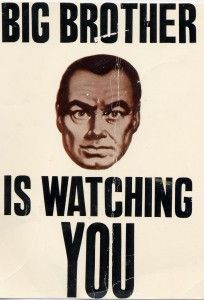CA lawmakers look to pull plug on NSA snooping

 Big Brother might have to close his eyes.
Big Brother might have to close his eyes.
A new bipartisan bill would prohibit California’s cooperation with warrantless snooping by the National Security Agency.
Senate Bill 828 is by state Sen. Ted Lieu, D-Redondo Beach. Invoking the Bill of Rights’ Fourth Amendment protections against unreasonable searches and seizures, SB828 would affect the state, its employees, its governmental subdivisions and even corporations providing services for the state.
According to the language of the bill, all those affected are barred from “materially supporting or assisting” any “federal agency or federal agent in collecting electronic data or metadata of any person pursuant to any action not based on a warrant that particularly describes the person, place, and thing to be searched or seized.”
That broad wording would extend legal protections against surveillance to non-citizens and citizens alike. Snooping with a warrant still would be allowed.
Additionally, SB828 bans the use of electronic data and metadata obtained without a warrant in state and local criminal investigations or prosecutions.
Dubbed the “Fourth Amendment Protection Act,” the bill would put California on a collision course with a major federal policy for the second time in recent years. Last October, the lawmakers passed the Trust Act. It introduced sweeping measures to shelter illegal immigrants from federal action.
Over strenuous objections of those favoring tighter immigration laws, Gov. Jerry Brown signed the Trust Act with a suite of other bills that activists estimated would keep some 20,000 undocumented people out of federal detention every year.
Anti-surveillance momentum
Nationally, California legislators stuck their necks out with the Trust Act.
But with SB828, they wouldn’t be alone. One of the bill’s two co-sponsors, State Sen. Joel Anderson, R-San Diego, invoked similar measures passed by state legislatures in Arizona, Maryland, Tennessee, Utah and Washington.
Anderson explained the bill “would stop NSA access to DMV records, Covered California records, state records, even voting records that might otherwise be confiscated at will.” Although “unequivocally dedicated to stopping terrorism,” Anderson insisted that Americans “must be ever vigilant that our desire for safety does not come at the expense of the freedoms and liberty our enemies seek to destroy.”
A press release describing the impact of the bill was also issued by Lieu. “State-funded public resources should not be going toward aiding the NSA or any other federal agency,” he said, in “indiscriminate spying on its own citizens” that “violates the Fourth Amendment.”
Last year, the release noted, Lieu successfully spearheaded a bipartisan resolution “urging Congress to reconsider its vote for the NSA to stop its unconstitutional practices.” That resolution, SR16, also called on President Obama to end “the NSA’s blanket, unreasonable, and unconstitutional collection of all Americans’ telephone records,” singling out overbroad uses of the PATRIOT Act for reform.
Earlier this year, Anderson and Lieu teamed up to push Sacramento to cut off the NSA from access to basic utilities and services in California. Then as now, Lieu explicitly compared NSA surveillance to the federal government’s wholesale detention of Japanese-Americans during World War Two, warning that the “last time the federal government massively violated the U.S. Constitution, over 100,000 innocent Americans were rounded up and interned.”
California leadership
As the debate continues in Congress over the scope and force of federal law surrounding America’s surveillance regime, elected officials in California face an opportunity to take a notable lead on the issue.
Democratic Sen. Dianne Feinstein, head of the Senate Intelligence Committee, was recently at the center of an unusually fierce dispute with the CIA over detention and interrogation. The controversy came to a head when Feinstein discovered that the CIA had secretly spied on Senate staffers working on a committee report critical of the agency’s practices.
Previously, Feinstein herself had been criticized for a lax attitude toward surveillance issues. The last time the Foreign Intelligence Surveillance Court turned down a government request to conduct electronic surveillance was in 2009.
Events will unfold quickly in California once legislators determine whether or not to support the bill. If passed, SB828 would go into immediate effect as an “urgency statute.”
Related Articles
More furloughs, but no budget
JULY 29, 2010 By KATY GRIMES Faced with a $19.1 billion state deficit and no acceptable budget in the works,
Mayors Scoff At Redevelopment Cuts
JAN. 27, 2010 This story first appeared in the San Francisco Examiner. By KATY GRIMES Redevelopment is crucial to creating
CA regulators plot end to gas-fueled cars
California officials have begun a massive effort to eventually eliminate gas-fueled cars from state roads, led by a powerful regulator with



